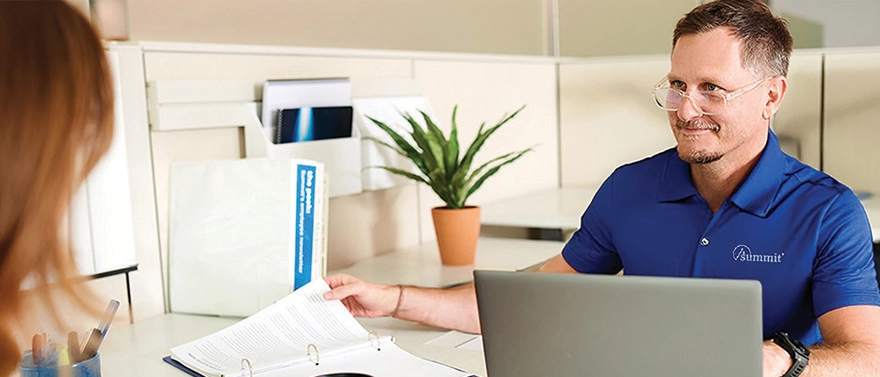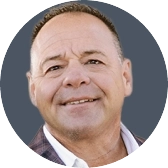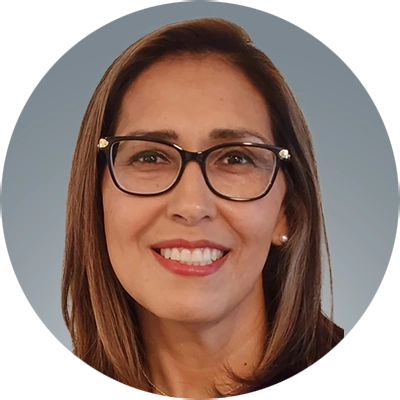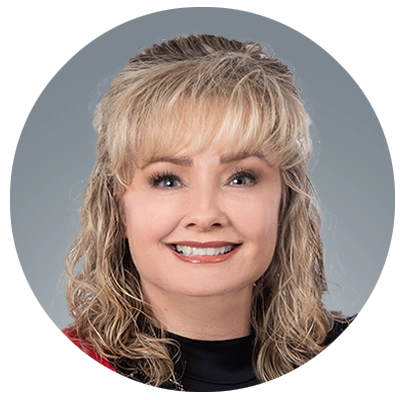In-House vs. Outsourcing: Choosing the Right Workers’ Comp Company
Most workers’ comp insurance companies outsource at least some services. Outsourcing typically reduces the quality of the customer experience.

At Summit, we have hundreds of customer-facing field staff members who live and work in all regions of our geographic footprint. And when you have a problem or need answers, you’re always able to talk to a human being in our U.S. customer care center.

“Summit doesn’t outsource its services. So, I can be confident that everything will run smoothly, without the mistakes or miscommunications that can happen through outsourcing. Our agency has an ongoing relationship with an exceptional underwriter. And our clients develop connections with claims, safety and premium audit personnel that last for years. Bottom line is that we don’t have to worry if Summit will come through for us on anything related to workers’ comp.”
-Greg Lane, Agency Partner, Insurance Management Group
Workers’ comp mastery for your clients
As a monoline insurance company, we focus 100% on workers’ comp. Imagine working with experts who have built their entire careers specializing in workers’ comp. Our underwriters, claims, loss prevention, customer care and premium audit employees—the departments that you’ll interact with regularly—have seen it all and know the nuances specific to comp. Remarkably, nearly half of Summit’s employees have been with the company for 15 years or longer.
Why you should trust Summit employees over outsourced third parties
- Third-party providers may lack expertise in handling specific workers’ comp cases.
- Companies using third parties can lose control over processes and the quality of service, leading to an unpredictable customer experience.
- Outsourcing brings more risk of data compromise as sensitive information has more exposure when it passes through third-party systems.
- Relying on third parties makes a company vulnerable if the provider fails to deliver or goes out of business. It creates a dependency that can disrupt operations.

“I feel that my contributions make a difference in people’s lives and that my ideas to improve service are heard. We make a great team—each department reaches out to the next to solve problems together. I feel appreciated here—and that feeling empowers me even more to extend the highest level of care and respect to agents, policyholders and injured employees.”
–Milagros Rodriguez, Summit Customer Service Lead
Easy access to exceptional customer care
We’re committed to resist the outsourcing trend in customer service and we never contract with domestic or foreign third-party call centers. When you call during business hours, you speak to a live U.S.-based Summit employee instead of an automated system. Our goal is to get you to the help you need as quickly as possible. We also have bilingual staff members who help Spanish-speaking policyholders and injured employees.
“These days, simply striving for satisfied customers isn’t good enough—we’re committed to creating such an extraordinarily positive experience that our customers have a better day because of Summit.”
– Cindy Santana, Summit Customer Care Director

“These days, simply striving for satisfied customers isn’t good enough—we’re committed to creating such an extraordinarily positive experience that our customers have a better day because of Summit.”
-Cindy Santana, Summit Customer Care Director
Compassionate claims handling leads to better injured employee outcomes
Kellie Chaloupka, senior vice president of claims and medical management, says a big reason that we don’t use third parties for claims handling is so we can quickly address what best serves our customers and results in the best outcomes for injured employees and their employers. She stresses the difference between processing a claim primarily from a cost perspective and serving an injured employee with empathy.
“We’re in the process of continuous improvement, and we control that through in-house claims management. We cannot force a third party to feel empathetic toward an injured employee. But within our walls and through our field employees—with compassion and empathy—we imagine ourselves in the shoes of the injured employee.”
Every injured employee has an assigned in-house adjuster as a primary contact to help with individual needs. Summit adjusters are specially trained for particular types of claims, such as medical only or lost time (indemnity). We also have a specialized unit and experienced adjusters in all of our states whom we rely on when catastrophic injuries occur.
Our adjusters handle primarily one state. This allows for a better understanding of jurisdictional nuances. “Plus, our adjusters are focusing only on comp,” adds Kellie. “They don’t have to keep rules, timelines, and other complexities of additional insurance lines in mind.”
Summit Medical Director Dr. Bob Martin says Summit’s quality of care is strengthened by having two onsite physicians on staff who interact daily with our adjusters and registered nurses. “There’s an open-door policy for adjusters to chat with the doctors about diagnoses, treatment, and recovery,” says Dr. Martin. “This is a huge benefit that sets us apart. Other comp carriers have physicians and nurses, but many are outsourced and work remotely. Outsourcing may be more affordable for the carrier, but it doesn’t result in the same quality of collaboration that can make the most positive impact on an injured worker’s care.”
Long-term relationships with Summit auditors simplify the premium audit experience
Audit may be one of the most dreaded words for any business owner, but Summit makes the process easier for your clients. More than 90% of our premium is audited by our own in-house auditing team—far higher than the industry average. Quality review is also a vital step in our premium audit process. Our audit team is available to assist you anytime you would like to help your clients prepare for audits. Most third-party auditors deal with many different types of business audits and may not know all the intricacies to a workers’ comp audit.
In most cases, your clients with Summit are assigned the same auditor every year. That means the auditors get to know their businesses—saving your clients the time and hassle of reeducating new auditors on the fundamentals of their businesses each year. When an audit gets out of control and frustrates your clients, there can be long-lasting effects on the business’s financial health, as well as the relationship you’ve built with your client. Summit’s goal is to minimize these frustrations.
Working with Summit is “a well-rounded experience of the highest quality,” says James Lumbra, president of LRA Insurance in Orlando. His agency tells of a client who had been with Summit for years. After experiencing another carrier, they were happy to come back to Summit because of the valuable relationship with our auditor. James describes LRA as “relationship-based, not a transactional agency,” which is why, in large part they have so much business with Summit. “We have mutual trust,” says James. “We know we won’t get burned, and that Summit’s expertise and responsiveness adds value to our relationships with clients and improves retention.”
Expert, proactive safety services reduce injuries
“Accountability makes all the difference,” says Summit Senior Vice President Mike Arnold. “When safety services are outsourced, it means those third parties are working for someone else—not the customer—meaning they’re essentially checking a box to say the work is done, and not having accountability to take care of businesses and the individuals whose safety is at risk. Summit has the full range of services that our employees take ownership of—and our customers see the results.”
“A few points come to mind about our workers’ comp safety services,” says Summit Senior Loss Prevention Manager Steven Hidalgo. “We’re committed to preventing incidents by working directly with your clients to offer tailored safety solutions and follow-up. We know that protecting a team of employees also means protecting a business and creating a stronger bottom line. That’s why we go far beyond providing a workers’ comp policy—we get to know your client’s unique safety needs through our in-house safety professionals who live and work in your communities. It’s all about proactive support.”
The Insurance Management Group agency in Indiana has moved a significant amount of its workers’ comp business to Summit. One of its policyholders, a nonprofit treatment facility for at-risk adolescents, faced safety incidents for years while working with another workers’ comp carrier. Like many behavioral health centers, they deal with frequent threats of physical altercations, but Summit came through with specialized advice to prevent situations from becoming physical.

“Summit’s risk management expertise has had such a swift and significant impact. It’s been encouraging to see the safety improvements that Summit has established to make sure employees and patients are protected.”
–Greg Lane, Agency Partner, Insurance Management Group
Workers’ comp is a business that demands tailored services from a committed team. As an agent, can you find a workers’ comp carrier that’s more prepared than Summit to guide you and your clients?

